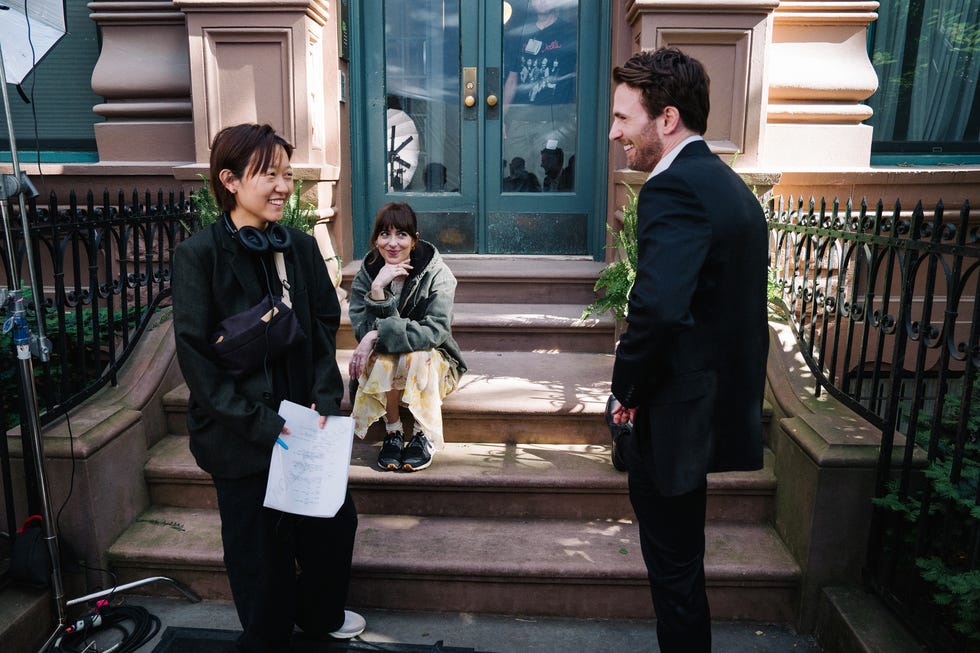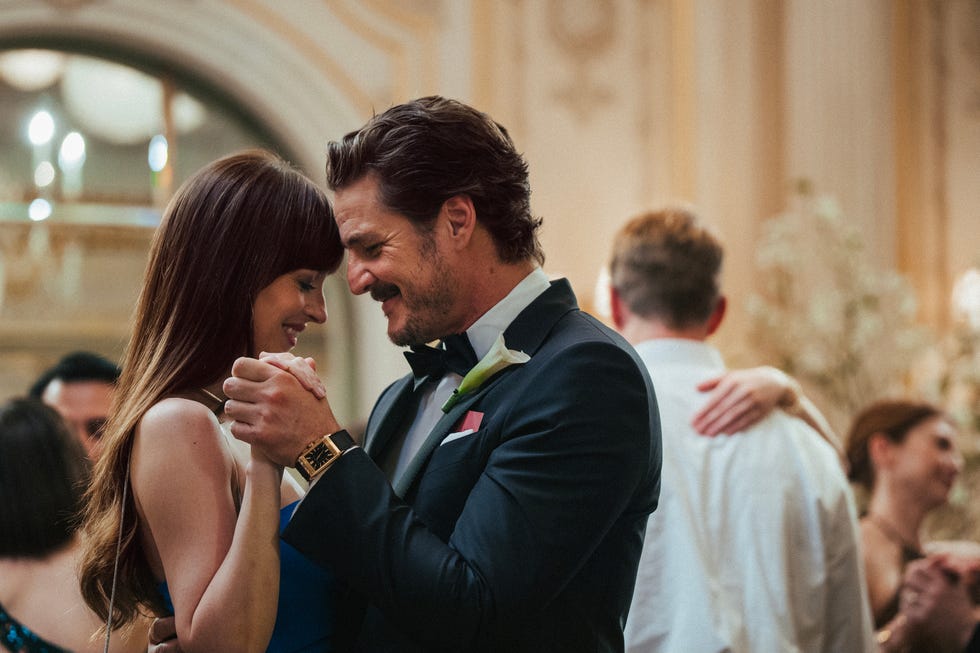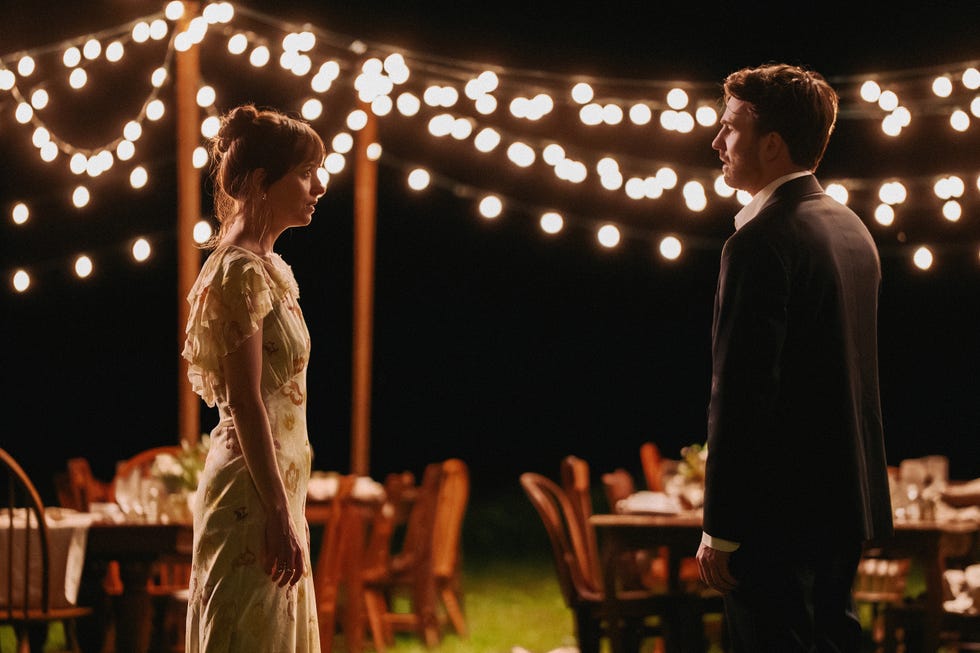How Filmmaker Celine Song Tapped Her Matchmaking Experience to Create <i>Materialists</i>


Almost a decade before she made her filmmaking debut with the swooning, Oscar-nominated drama Past Lives in 2023, writer-director Celine Song found herself in an impossible quandary that many artists can relate to. She was a playwright in New York City, and like the rest of us, had bills to pay and rent to make. In other words, she needed a day job. But Song quickly realized that in a city of dreamers, all with various side hustles, most of the day jobs were exceedingly competitive and held by highly qualified people. “I couldn’t become a barista, as I didn’t have 10 years of barista experience,” she recalls, during a recent conversation with ELLE. “I couldn’t be in retail, and I wasn’t being hired for anything. So I was feeling a little desperate.”
A chance encounter at a party eventually opened a door when Song found herself talking to someone with a day job in matchmaking. She made the connection, applied and interviewed for a spot, and ended up working as a matchmaker for six months. It was a life-defining experience that informed the heart of her latest romance, Materialists, and became a period of her life that taught her more about people than any other time. (The reason she quit? She was having almost too much fun: “I could feel myself wanting to become lifelong matchmaker,” she laughs.) While she didn’t stay there long enough to see any relationships go beyond a second date (and a second date was a huge deal), the wisdom she earned from matchmaking is all over Materialists, a sophisticated and brutally honest romantic drama anchored in Song’s signature proficiencies as a storyteller: It boasts keenly observed moments, heart-swelling chemistry amid the cast, and a soul-nourishing parting note.

Song, Dakota Johnson, and Chris Evans on the set of Materialists.
The story follows high-profile matchmaker Lucy (Dakota Johnson) as she holds her clients’ hands through the city’s impossibly demanding dating scene. Her work introduces her to Pedro Pascal’s eligible bachelor Harry, a tall, rich, charming, and handsome gentleman who is, in Lucy’s words, “a unicorn”—someone who has it all and checks every single one of her company’s boxes. The problem is, Harry is more interested in dating Lucy, who is quick to say that he could do better than someone who is in debt, less educated, and makes $80,000 before taxes. Also in the picture is Lucy’s ex John (Chris Evans), a catering employee and a penniless actor whose relationship with Lucy came to end amid the couple’s financial struggles. That experience quickly defined one of Lucy’s must-haves in men: They must be rich. Exceedingly, if possible.
That’s the way many of the film’s characters think and talk, seeing potential matches as a collection of resumes and profile factoids, as opposed to multifaceted individuals with real lives and feelings. Portraying these harsh and unflattering realities is no easy task, and Song deserves all the credit for perceptively depicting them. She walks a very fine line between acknowledging these truths and holding onto timeless notions like love and romance for dear life. “That was the dilemma of the movie,” she explains. “And the dilemma of modern people, too. All I can really speak to is how this dilemma feels to me personally. What’s amazing about New York City is, it’s both a city of romantics—because all of us here are dreaming and hoping for something—and cynics. To survive in New York City, you have to be cynical, too. You have to be practical and materially smart.”

Johnson as Lucy and Pedro Pascal as Harry in Materialists.
Part of the reason why Materialists works so well is Song’s dexterity in portraying how romance and cynicism pull against one another. “While I was a matchmaker, I was asking my clients to describe their ideal partner and the answers were all numbers: height, weight, income, age… While I understood why they were asking for those things, I knew from being in love myself that that’s just not at all what love is about or feels like. So [making this] movie was about [striking] the balance between the practical and the fantasy of true love.” Sure enough, Song succeeds and gives us complex characters whom she doesn’t judge, even in their darkest and most shallow moments. “I don’t mean to say that the judgment is not there. Of course, all of us are judging each other at all times in some way,” she explains. “But the thing that feels true to me is about recognizing where the character actually comes from. Why is that character going through that?”
“To survive in New York City, you have to be cynical, too. You have to be practical and materially smart.”
She is generous and insightful with supplying those reasons throughout Materialists. In one of the movie’s best scenes, a flashback shows us how $25—a trivial sum to some, but a consequential amount to others—once started a fight between Lucy and John. Running late to their anniversary dinner in John’s car, Lucy wants to just park in one of those overpriced NYC lots, whereas John insists on finding street parking. “I’ve had that argument with my husband,” Song confesses with a laugh. “We were both broke playwrights and we never had a car. But we had a rental or something. I don't think it's possible for you to drive in New York City, be broke, and not have a great argument about parking.”
On a different end of the spectrum, we also witness the myriad ways people, who’ve had and want to avoid these struggles, are consequently commodified in the modern dating scene—a truth that one of Lucy’s significant clients, Sophie (Zoë Winters), voices in protest after a horrific and dangerous date: “I’m not a merchandise. I’m a person.” It’s a line that Song describes as the key to the whole film. “You’re playing a fun game until one day something becomes totally dehumanizing. It makes all of us less of a person, less of humans.”

Song differentiated John and Harry’s financial means by using different filming styles.
Doing justice to the film’s title meant portraying materialism not only thematically, but also visually and through design choices based on the characters’ carefully considered income levels. On the page, Song knew exactly how much someone’s wardrobe or apartment cost—there were hard numbers attached to items and locations, some of which are spelled out in the film. (For instance, we know that Harry’s ultra-chic Tribeca apartment costs $12 million.) And she had fun collaborating with her department heads in bringing them to life. In styling Lucy, someone who was born and raised poor but is now making a decent living and trying to project luxury, she and costume designer Katina Danabassis had discussions around what that might look like. Perhaps some pieces from Aritzia, the semi-affordable yet stylish brand that evokes “everyday luxury,” as well as splurges she stretched her means for, like a special occasion bag. “We were like, ‘Well, Lucy probably bought that dress from a discount store. I bet it was pre-owned.’ Then of course it informs what something like that costs when it’s used. And then [we aged] some clothing so that they felt used.”
For John’s apartment, the challenge was finding a New York neighborhood where one could get an $850 rent-stabilized unit. Song originally wrote it to be in Bushwick, but…well, that changed. “My location manager was like, ‘Bushwick is too nice now. It’s too expensive,’” she laughs. So the production went with Sunset Park and shot the exteriors of John’s place on location. The interiors were built and coated in what Song calls “a very recognizable wall color of a bad New York City rental.” Differentiating John and Harry’s financial means also meant using distinctive camera movements, which she and cinematographer Shabier Kirchner deliberated on. In addition to the warm, velvety way Harry’s apartment is lit (in contrast to the starkness of John’s place), the duo decided that when Harry moves, it needed to be captured smoothly via a dolly. For the determined Lucy, she often went with Steadicam. And a handheld style was paired with John, in step with the shaky chaos of his financially unstable life.

“If you’re very wealthy, money is almost like a fictional thing. But for somebody who needs five more dollars to eat, money is real,” Song says.
To Song, none of these choices were meant to imply that having more money makes a person more materialistic. In fact, it’s quite the opposite. “The truth is, the less you have, the more materialistically you have to think, because every dollar counts. If you’re very wealthy, money is almost like a fictional thing. But for somebody who needs five more dollars to eat, money is real.”
“Love is meaningless unless it’s unconditional. And that, to me, is non-negotiable.”
Throughout Materialists, there is this notion of a non-negotiable—the thing you aren’t willing to compromise on while choosing your significant other. For Song, that thing is simple: “That they love me,” the self-professed romantic says. “Love is meaningless unless it’s unconditional. And that, to me, is non-negotiable.” This answer isn’t going to surprise anyone who’s already seen Materialists and shed some happy tears in front of the film’s proudly non-cynical ending. “What can Lucy do when she’s offered love other than saying, ‘Deal’? She is given an offer that she can’t refuse. [And that idea] is in the lyrics of the song that John and Lucy dance to, [‘That’s All’]. I love that song. My husband played it for me,” she shares.
In the end, this is the idea and feeling that Song wants everyone to take away from the film. “You can see the movie as a looking glass, or you can see it as a mirror. It’s personal, and the dream of this movie is for the audiences to take it personally, to let it get under their skin,” the director says. “You can refuse a $12 million apartment. But [it is] a crime against yourself is to say no to love.”
elle





